"Moon Knight" will conclude at 3 AM ET Wednesday.
Related art —

Related cinematic art — ("Tomb Raider," 2018) —
An image that some — perhaps even Uncle Walt himself —
might prefer to the above depiction of Lara Croft —
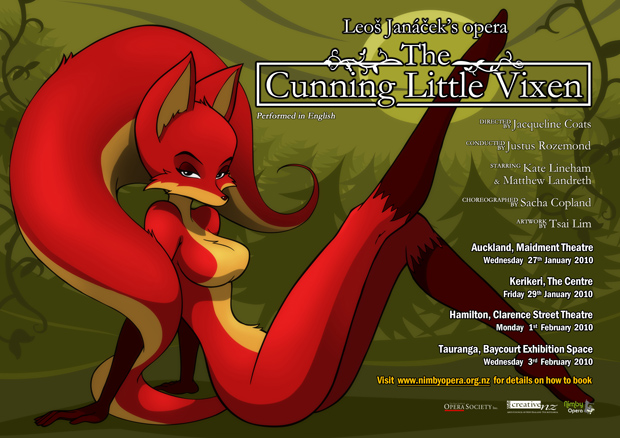
"Moon Knight" will conclude at 3 AM ET Wednesday.
Related art —

Related cinematic art — ("Tomb Raider," 2018) —
An image that some — perhaps even Uncle Walt himself —
might prefer to the above depiction of Lara Croft —


See as well an obituary for Mrs. Wertham from 1987.
Related art —
Friday, July 11, 2014
|
For further details, search the Web for "Wertham Professor" + Eck.
"When times are mysterious
Serious numbers
Will always be heard."
— Paul Simon,
"When Numbers Get Serious"
"There is a pleasantly discursive treatment of
Pontius Pilate's unanswered question 'What is truth?'"
— H. S. M. Coxeter, introduction to Richard J. Trudeau's remarks
on the "story theory" of truth as opposed to the "diamond theory"
of truth in The Non-Euclidean Revolution (1987)
The deaths of Roth and Grünbaum on September 14th,
The Feast of the Holy Cross, along with Douthat's column
today titled "Only the Truth Can Save Us Now," suggest a
review of …
In memory of David Douglas Duncan
"Marissa, we picked up an unencrypted signal
below the Arctic Circle." — Hanna (2011)
“Show me all the blueprints.”
— Howard Hughes, according to Hollywood
From an old Dick Tracy strip —
This journal in April 2006 —
Cleaning out her studio, Oslo artist Josefine Lyche
has found some frames from an old art-school audition video —
(Click to enlarge.)
* Search for "st.+peter"+eve+adam+"first+words"
An artist mentioned in a NY Times obituary this morning —
(Click for the source.)
I prefer some not-so-magic circles —
Click for related posts tagged root circle.
Wil S. Hylton today in the online New York Times —
"It seems to me now, with greater reflection,
that the value of experiencing another person’s art
is not merely the work itself, but the opportunity
it presents to connect with the interior impulse of another.
The arts occupy a vanishing space in modern life:
They offer one of the last lingering places to seek out
empathy for its own sake, and to the extent that
an artist’s work is frustrating or difficult or awful,
you could say this allows greater opportunity to try to
meet it. I am not saying there is no room for discriminating
taste and judgment, just that there is also, I think,
this other portal through which to experience creative work
and to access a different kind of beauty, which might be
called communion."
Or damnation.

The title is a reference to the Chicago character named "Four"
in Veronica Roth's Divergent series.
"In July 2014, Roth revealed that she initially wrote
Divergent from Four's point of view . . . ." — Wikipedia
Other Chicago-related stories — "Raiders of the Lost Code"
(on the recent murder-suicide of two Chicago Jungians)
and the following —
See also Jungian narrative art in
https://redice.tv/news/
on-the-nature-of-four-jung-s-quarternity-mandalas-the-stone-and-the-self .

"Again, in spite of that, we call this Friday good."
— T. S. Eliot, Four Quartets
From this journal on Orthodox Good Friday, 2016,
an image from New Scientist on St. Andrew's Day, 2015 —
From an old Dick Tracy strip —

See also meditations from this year's un -Orthodox Good Friday
in a Tennessee weblog and in this journal —
" There is a pleasantly discursive treatment
of Pontius Pilate’s unanswered question
‘What is truth?’ ”
— Coxeter, 1987, introduction to Trudeau’s
The Non-Euclidean Revolution
Combining two headlines from this morning’s
New York Times and Washington Post , we have…
Deceptively Simple Geometries
on a Bold Scale
Voilà —
Click image for details.
More generally, see
Boole vs. Galois.
Today in History —
"On December 21, 1937, 'Snow White and the Seven Dwarfs'
premiered to a record-breaking audience at the Carthay Circle
Theatre in Los Angeles."
Related material: Today's previous post and the Red Book.
In memory of art dealer Leslie Waddington, who
reportedly died at 81 on St. Andrew's Day, 2015,
a search for "Terry Frost" in this journal.
The previous post mentioned a new mobile, "Triangle Constellation,"
commissioned for the Harvard Art Museums.
Related material (click to enlarge) —
The above review is of an exhibition by the "Constellation" artist,
Carlos Amorales, that opened on Sept. 26, 2008 — "just in time for
Halloween and the Day of the Dead."
See also this journal on that date.
Thanks to the Museum of Modern Art for pointing out
a new emphasis on design in U.S. Army Field Manual 5-0.
MoMA supplies a link to an article from May 3, 2010:
Design Thinking Comes to the U.S. Army.
An excerpt from the manual:

An approach to this text by Harvard's legendary "unreliable reader"—
"The risks multiply, especially when a problem involves 26 March 2010…."
For the late Allen E. Puckett, Hughes Aircraft engineer and CEO,
who reportedly died at 94 on March 31 (the birthday of René Descartes) —
Geometer H. S. M. Coxeter died on this date in 2003.
This evening’s daily number from the Keystone state: 822.
Frederick Hart’s 1982 sculpture “Ex Nihilo” for Washington’s National Cathedral—

Related material — Tom Wolfe on Frederick Hart, said to have been
published in The New York Times Magazine of Sunday, Jan. 2, 2000—
| In 1982, Ex Nihilo was unveiled in a dedication ceremony. The next day, Hart scanned the newspapers for reviews… The Washington Post… The New York Times… nothing… nothing the next day, either… nor the next week… nor the week after that. The one mention of any sort was an obiter dictum in The Post ‘s Style (read: Women’s) section indicating that the west facade of the cathedral now had some new but earnestly traditional (read: old-fashioned) decoration. So Hart started monitoring the art magazines. Months went by… nothing. It reached the point that he began yearning for a single paragraph by an art critic who would say how much he loathed Ex Nihilo… anything, anything at all!… to prove there was someone out there in the art world who in some way, however slightly or rudely, cared.
The truth was, no one did, not in the least. Ex Nihilo never got ex nihilo simply because art worldlings refused to see it. |
Art worldings are one thing, Hollywood another.
Al Pacino’s moving wall sculpture in “The Devil’s Advocate” (1997)—

“After the film’s initial release, sculptor Frederick Hart sued Warner Bros.
claiming that a large sculpture prominently featured in the film
(on the wall of Al Pacino’s penthouse apartment) is an unauthorized copy
of his work ‘Ex Nihilo,’ displayed at the entrance of Washington’s Episcopal
National Cathedral.” — IMDb
A sequel to Friday afternoon's Diamond Star
Diamond Star —

|
A doodle from this year's [2012’s] Feast of the Epiphany—
A doodle based on today's previous post and on
|
Context — All posts tagged "Eden."
Continued from Pensée (Feb. 10, 2012).*
Nick Paumgarten in The New Yorker of Dec. 2, 2013—
" When one speaks of Zwirner the gallerist, one is speaking
as much of a handful of women in their forties who have been
with the gallery fifteen or more years. Zwirner has made them
partners, meaning, he says, that they 'will participate in profits
as the gallery does well.' They are Angela Choon, who runs the
London gallery; Hanna Schouwink, from Holland; Bellatrix Hubert,
from France; and Kristine Bell, from outside Buffalo. Seeing them
all together, at an opening or a dinner, brings to mind David
Carradine’s gang of glamorous assassins in 'Kill Bill.' "
See also the previous post, on An Object of Beauty.
* For some related art, see Square Round.
The Mitgang Menu
Related material: This morning's 6 AM post and Wiener News.
Update of 3:29 PM:
From Herbert Mitgang's New York Times
obituary of Cleanth Brooks—
"The New Critics advocated close reading of literary texts
and detailed analysis, concentrating on semantics, meter,
imagery, metaphor and symbol as well as references to
history, biography and cultural background."
(Continued from 24 hours ago and from May 9, 2012)
Quoted 24 hours ago in this journal—
Remark by Aldous Huxley on an artist's work:
"All the turmoil, all the emotions of the scenes
have been digested by the mind into a
grave intellectual whole."
Quoted in a video uploaded on May 9, 2012:
Norway Toilet Scene

Norway dance (as interpreted by an American)

I prefer a different, Norwegian, interpretation of "the dance of four."
Related material: The clash between square and tetrahedral versions of PG(3,2).
The New York Times philosophy column "The Stone"
last evening had an essay on art by a sarcastic anarchist,
one Crispin Sartwell—
"… whole generations of art lovers have been
trained in modernist dogma, and arts institutions’
access to various forms of state or foundation
support depend on it completely. One goes to
the museum to gasp at stunning works of
incomparable, super-human genius by beings
who are infinitely more exalted and important
than the mere humans staring at their paintings.
That’s why ordinary people staring at a Picasso
(allegedly) experience a kind of transcendence
or re-articulation of their lives and world."
Cubism Re-Articulated:
Click image for some backstory.
(IMAGE: Walter Gropius and Froebel's Third Gift,
from a Google image search today)
Background: Cubism in this journal and
Pilate Goes to Kindergarten.
Related material: Chesterton + Thursday in this journal.
"By groping toward the light we are made to realize how deep the darkness is around us."
— Arthur Koestler, The Call Girls: A Tragi-Comedy , Random House, 1973, page 118
Monolith for Maggie, continued from yesterday
"The young woman counted—
'Otu, abua, ato, ano, ise, isii, asaa'—
using what remained to her of
the secret language…."
— Opening sentence of the prologue to The Choir Boats,
a 2009 novel by Daniel A. Rabuzzi
The piano link in today's previous post suggests a review
of a post from Feb. 11, 2008. That post suggests in turn
a passage from the Trevanian classic The Eiger Sanction
that says, in part…
"Often it was unnecessary to finish a sentence…."
Today's previous post, "For Odin's Day," discussed
a mathematical object, the tesseract, from a strictly
narrative point of view.
In honor of George Balanchine, Odin might yield the
floor this evening to Apollo.
From a piece in today's online New York Times titled
"How a God Finds Art (the Abridged Version)"—
"… the newness at the heart of this story,
in which art is happening for the first time…."
Some related art—
and, more recently—
This more recent figure is from Ian Stewart's 1996 revision
of a 1941 classic, What Is Mathematics? , by Richard Courant
and Herbert Robbins.
Apollo might discuss with Socrates how the confused slave boy
of Plato's Meno would react to Stewart's remark that
"The number of copies required to double an
object's size depends on its dimension."
Apollo might also note an application of Socrates' Meno diagram
to the tesseract of this afternoon's Odin post—
For art collector Herbert Vogel,
who reportedly died today
Philip Kennicott in The Washington Post , July 3, 2009—
"The Vogels help allay deep cultural fears
within the art world— fears that art is elitist,
or some kind of confidence game,
or not a serious endeavor (a fear that has
dogged art since at least the time of Plato)."
Some related material from finitegeometry.org,
offered without comment—
On author Paul Fussell, who died today—
"Vincent B. Sherry, writing* in The Cambridge Companion
to the Literature of the First World War , called Mr. Fussell’s
book 'the fork in the road for Great War criticism.'"
— Christopher Lehmann-Haupt in The New York Times
"When you come to a fork in the road…"

* Actually, the writing was by James Campbell. Sherry was the book's editor.
See Campbell's "Interpreting the War," pp. 261-279 of the 2005 (first) printing.
The fork is on page 267.
Update of 9:26 PM— In the latest version of Lehmann-Haupt's article, the fork
has disappeared. But Campbell's writing is still misidentified as Sherry's.
On the Complexity of Combat—
The above article (see original pdf), clearly of more
theoretical than practical interest, uses the concept
of "symmetropy" developed by some Japanese
researchers.
For some background from finite geometry, see
Symmetry of Walsh Functions. For related posts
in this journal, see Smallest Perfect Universe.
Update of 7:00 PM EST Feb. 9, 2012—
Background on Walsh-function symmetry in 1982—
(Click image to enlarge. See also original pdf.)
Note the somewhat confusing resemblance to
a four-color decomposition theorem
used in the proof of the diamond theorem.
The reference in yesterday morning's post "The Speed of Thought"
to an art critic's webpage on what she calls "psychic art"
suggests an illustration of another sort of psychic art, from
the oeuvre of the late film director Don Sharp—
See also a Log24 post, "Go Ask Alice," from the above video's uploading date.
See the signature link in last night's post for a representation of Madison Avenue.
For a representation by Madison Avenue, see today's New York Times—

"As a movement Pop Art came and went in a flash, but it was the kind of flash that left everything changed. The art public was now a different public— larger, to be sure, but less serious, less introspective, less willing or able to distinguish between achievement and its trashy simulacrum. Moreover, everything connected with the life of art— everything, anyway, that might have been expected to offer some resistance to this wholesale vulgarization and demoralization— was now cheapened and corrupted. The museums began their rapid descent into show biz and the retail trade. Their exhibitions were now mounted like Broadway shows, complete with set designers and lighting consultants, and their directors pressed into service as hucksters, promoting their wares in radio and television spots and selling their facilities for cocktail parties and other entertainments, while their so-called education programs likewise degenerated into sundry forms of entertainment and promotion. The critics were co-opted, the art magazines commercialized, and the academy, which had once taken a certain pride in remaining aloof from the blandishments of the cultural marketplace, now proved eager to join the crowd— for there was no longer any standard in the name of which a sellout could be rejected. When the boundary separating art and fashion was breached, so was the dividing line between high art and popular culture, and upon all those institutions and professions which had been painstakingly created to preserve high art from the corruptions of popular culture. The effect was devastating. Some surrendered their standards with greater alacrity than others, but the drift was unmistakable and all in the same direction— and the momentum has only accelerated with the passage of time."
— Hilton Kramer, The Triumph of Modernism: The Art World, 1985-2005 , publ. by Ivan R. Dee on Oct. 26, 2006, pp. 146-147
Related material— Rubik in this journal, Exorcist in this journal, and For the Class of '11.
This evening's New York Times obituaries—
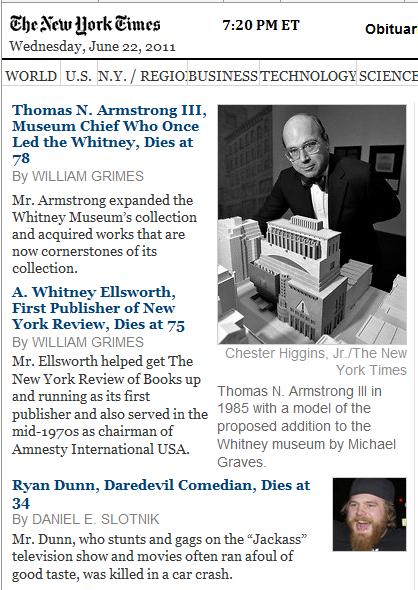
A work of art suggested by the first and third items above—
I prefer a work of art that is structurally similar—
and is related to a picture, Portrait of O, from October 1, 1983—

For a recent unexpected Web appearance of Portrait of O,
aee Abracadabra from the midnight of June 18-19.
Part I— A Naples, Florida obituary for artist Robert Vickrey, who died Sunday.
(See also this evening's earlier post Soul Art.)
Part II— "Stairway to Heaven," by Vickrey
Part III— Definition of "cornette"
Part IV— Recent photo of artist Josefine Lyche
Escape from Kitsch Mountain
"Why you gotta be so mean?" — Taylor Swift (see last night)
This song includes, as part of the hook, the recurring phrase
"Someday I'll be livin' in a big ol' city."
From a big ol' city—
A Return to Kitsch Mountain
By AUSTIN CONSIDINE
Published in The New York Times on January 16, 2009
As my girlfriend, Larissa, and I approached Gatlinburg, Tenn., this fall, I did my best to prepare her. She hadn’t been to Gatlinburg before, but I had. I understood the town’s complicated reputation both as a gateway to some of the most beautiful country in the United States— the Great Smoky Mountains National Park— and as a flamboyant capital of kitsch….
… It turned out that by 8 or 9 p.m., it was way too late to find a dinner show. The next morning, we had the opposite problem. By the time we woke up and wandered into Gatlinburg, it was noon. All the pancake houses were closed, and I was desolate. I had been thinking about those pancakes since the night before. So we did a little more sightseeing on foot.
Looking at Gatlinburg’s strip with adult eyes, I wondered how much self-awareness was at work there. It would be easy for a city slicker to assume this place misses its own punch lines. In truth, I decided, it merely embraces that special brand of conscious kitsch that forms its own American kind of authenticity. With all its absurdities, Gatlinburg knows what it is and proclaims it loudly, from one flashing signboard to the next….
From Gatlinburg—

In memory of Irvin Kershner,
director of A FIne Madness and
The Empire Strikes Back
Keanu vs. the Devil, continued
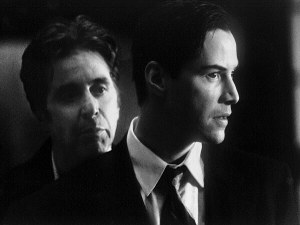
Al Pacino and Keanu Reeves in Devil's Advocate
For Keanu —
For Keanu's mentor —
… There is a Cave
Within the Mount of God, fast by his Throne,
Where light and darkness in perpetual round
Lodge and dislodge by turns, which makes through Heav'n
Grateful vicissitude, like Day and Night….
— Paradise Lost , by John Milton
|
Click on figure for details. |
Al Pacino in Devil's Advocate |
Today's New York Times—
(“Yves Klein: With the Void, Full Powers”
runs through Sept. 12 at the Hirshhorn.)
Related material—
Search this journal for klein + paris.
See also Art Space (May 22, 2010)—
|
Pictorial version |
|
Darkness Visible
The inevitable tribute to Martin Gardner
has now appeared at the AMS website—
Related Imagery—
The following is an image from Saturday morning—

See also Art Wars and
Mathematics and Narrative.
You Can't Make This Stuff Up
Art review by Holland Cotter in The New York Times this morning–
"Although Confucius initially escaped severe censure by Mao, in the early 1970s he became 'No. 1 hooligan,' the embodiment of the hated 'four olds' (old culture, old ideology, old customs and old habits), a symbol of ruling-class oppression."
For another hooligan fond of old customs, see yesterday's post and Sterling Hayden in "The Asphalt Jungle"–

Related material:
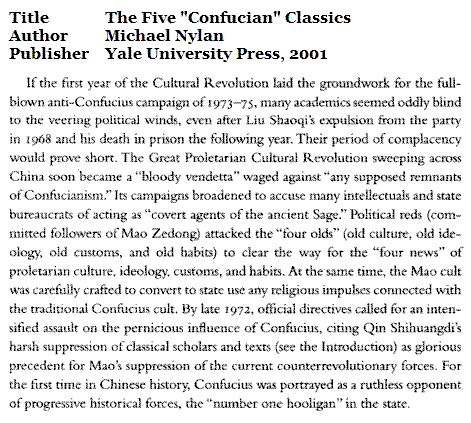
Yesterday's post on Sabbath's Theater, the 1995 novel by Philip Roth, posed the problem of why Roth would make his friend, painter R. B. Kitaj, the model for the novel's obnoxious protagonist. (See Wikipedia's claim, below, that this happened.)

Here is a possible explanation for the Wikipedia claim–
Wikipedia states that painter R.B. Kitaj (see previous references) was the model for the protagonist of the Philip Roth novel Sabbath's Theater.
A Google search shows that the article (no longer online) on Kitaj cited as a source by Wikipedia does indeed make this claim–
In-Your-Face Outsider | Jerusalem Report | Jerusalem Post
By MATT NESVISKY … not least, Philip Roth, who modeled
the protagonist of the 1995 novel "Sabbath's Theater" largely after Kitaj. …
www.jpost.com/servlet/Satellite?apage=2&cid=1192380767901…
The rest of Nesvisky's article may or may not support his claim. It is available by subscribing to HighBeam.
Related material–
The New York Times on Oct. 24, 2007–
R. B. Kitaj, Painter of Moody Human Dramas, Dies at 74Ileana Sonnabend, Art World Figure, Dies at 92Ileana Sonnabend’s eye, shrewdness and lasting alliance with her first husband, Leo Castelli, made her one of the most formidable contemporary art dealers of her time. |
"Sonnabend" means "Saturday" in German.
Some say the Sabbath is Saturday, others say Sunday.
Here is the Log24 entry for the day that
Kitaj and Sonnabend died– a Sunday—
Sunday October 21, 2007Halloween “The Game in the Ship cannot be approached as a job, a vocation, a career, or a recreation. To the contrary, it is Life and Death itself at work there. In the Inner Game, we call the Game Dhum Welur, the Mind of God. And that Mind is a terrible mind, that one may not face directly and remain whole. Some of the forerunners guessed it long ago– first the Hebrews far back in time, others along the way, and they wisely left it alone, left the Arcana alone.”
|
The New York Times on Sonnabend:
… Also talked about was the Sonnabend 1991 show of Jeff Koons’s “Made in Heaven” series of paintings and sculptures that showed the artist engaged in sexual acts with his wife, Ilona Staller.
Mrs. Sonnabend was variously described as “an iron marshmallow” and “a cross between Buddha and Machiavelli.” Short and plump, she was grandmotherly in appearance from a relatively early age due in part to an illness that necessitated a wig.
Her genteel, old Europe manner belied an often imperious yet bohemian and self-deprecating personality. Her soft, fluty voice often left a listener unprepared for the force of her comments, which she could deliver in at least five languages.
Happy Women's History Month.
The Difference
There is a small but important difference
between "No One" and "No. One."
Images from a website in this journal
on June 10, 2009:

That website's author died this afternoon.
For related symbols, see the five Log24 entries
ending on June 10, 2009.
Note the resemblance of the following work
pictured here on that date
to the 1958 painting "No. One,"
by the late Kenneth Noland–
A Sermon from Christchurch
in The New York Times
Related material:
|
"In the story 'Guy de Maupassant' (completed 1922, published 1932) Babel, or at least a narrator we are led to suppose is Babel, pronounces: 'A phrase is born into the world good and bad at the same time. The secret rests in a barely perceptible turn. The lever must lie in one's hand and get warm. It must be turned once, and no more.' To him words are an army, 'an army in which all kinds of weapons are on the move. No iron can enter the human heart as chillingly as a full stop placed at the right time.' This iron, an aggressive partner to Kafka's 'axe for the frozen sea within us', is something Babel learned to wield with recurring, unerring accuracy." — Chris Power in The Guardian , 10 February 2012 |
See as well "Art Wars for Trotsky's Birthday"
and some historical background.
|
On the late Cambridge astronomer Donald Lynden-Bell — "As an academic at a time when students listened and lecturers lectured, he had the disconcerting habit of instead picking on a random undergraduate and testing them on the topic. One former student, now a professor, remembered how he would 'ask on-the-spot questions while announcing that his daughter would solve these problems at the breakfast table'. He got away with it because he was genuinely interested in the work of his colleagues and students, and came to be viewed with great affection by them. He also got away with it because he was well established as a titan of the field." — The London Times on Feb. 8, 2018, at 5 PM (British time) |
Related material —
Two Log24 posts from yesteday, Art Wars and The Void.
See as well the field GF(9) …
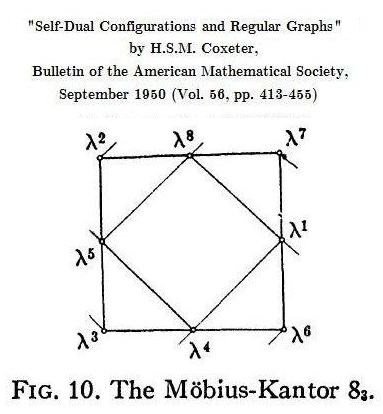
… and the 3×3 grid as a symbol of Apollo
(an Olympian rather than a Titan) —
See the previous post and, from some April 1 ART WARS remarks …
See also reviews of a new Ellen Page film, "Flatliners."
Notes on space for day 13 of May, 2015 —
The 13 symmetry axes of the cube may be viewed as
the 13 points of the Galois projective space PG(2,3).
This space (a plane) may also be viewed as the nine points
of the Galois affine space AG(2,3) plus the four points on
an added "line at infinity."
Related poetic material:
The ninefold square and Apollo, as well as …


(A sequel to yesterday's ART WARS and this
morning's De Colores )
“Perhaps the philosophically most relevant feature
of modern science is the emergence of abstract
symbolic structures as the hard core of objectivity
behind– as Eddington puts it– the colorful tale
of the subjective storyteller mind.” — Hermann Weyl
(Philosophy of Mathematics and Natural Science ,
Princeton, 1949, p. 237)
See also Deathly Hallows.
From "How the Guggenheim Got Its Visual Identity,"
by Caitlin Dover, November 4, 2013 —

For the square and half-square in the above logo
as independent design elements, see
the Cullinane diamond theorem.
For the circle and half-circle in the logo,
see Art Wars (July 22, 2012).
For a rectangular space that embodies the name of
the logo's design firm 2×4, see Octad in this journal.
Columbia University physics writer Peter Woit dubbed
yesterday Snowpocalypse 2015 in New York City.
Woit used the day to ponder a new book by mathematician
Michael Harris, Mathematics without Apologies .
Related material: a search for Michael Harris in this journal.
That search includes…
The above art includes an image of William Rubin,
former director of painting and sculpture at the
Museum of Modern Art. Rubin reportedly died on
January 22, 2006. See Log24 posts from that date.
(Night at the Museum continues.)
"Strategies for making or acquiring tools
While the creation of new tools marked the route to developing the social sciences,
the question remained: how best to acquire or produce those tools?"
— Jamie Cohen-Cole, “Instituting the Science of Mind: Intellectual Economies
and Disciplinary Exchange at Harvard’s Center for Cognitive Studies,”
British Journal for the History of Science vol. 40, no. 4 (2007): 567-597.
Obituary of a co-founder, in 1960, of the Center for Cognitive Studies at Harvard:
"Disciplinary Exchange" —
In exchange for the free Web tools of HTML and JavaScript,
some free tools for illustrating elementary Galois geometry —
The Kaleidoscope Puzzle, The Diamond 16 Puzzle,
The 2x2x2 Cube, and The 4x4x4 Cube
"Intellectual Economies" —
In exchange for a $10 per month subscription, an excellent
"Quilt Design Tool" —
This illustrates not geometry, but rather creative capitalism.
Related material from the date of the above Harvard death: Art Wars.
From a New York Times obituary by Bruce Weber tonight—
Charles Marowitz, Director and Playwright, Dies at 82
“There are two kinds of bafflement in the theater: the kind that fascinates as it perplexes, and the kind that just perplexes,” he wrote in The Times in 1969 in an essay about Mr. Shepard’s play “La Turista,” which had recently opened in London. “If a play doesn’t make quick sense, but enters into some kind of dialogue with our subconscious, we tend to admit it to that lounge where we entertain interesting-albeit-unfamiliar strangers.
“If it only baffles, there are several courses open to us: we can assume it is ‘above our heads’ or directed ‘to some other kind of person,’ or regretfully conclude that it confuses us because it is itself confused. However, the fear of being proved wrong is so great today that almost every new work which isn’t patently drivel gets the benefit of the doubt.”
Another play by Sam Shepard mentioned in the obituary suggests a review of…
Art Wars view —
image from a post at noon on Saturday, April 12:
Kansas City view:
Review of Seeing Gray , a book by pastor Adam Hamilton
of the United Methodist Church of the Resurrection
in Leawood, Kansas, a suburb of Kansas City—
“Adam Hamilton invites us to soulful gray space
between polarities, glorious gray space that is holy,
mysterious, complex, and true. Let us find within
our spirits the courage and humility to live and learn
in this faithful space, to see gray, to discern a more
excellent way.”
—Review by United Methodist Bishop Hope Morgan Ward
The above quotation was suggested by the following from today’s
online Kansas City Star :
“Two of the victims were 14-year-old Reat Griffin Underwood
and his grandfather, William Lewis Corporon, who attended the
United Methodist Church of the Resurrection in Leawood.
The Rev. Adam Hamilton, the church’s senior pastor, shared
the news with church members at the beginning of the evening
Palm Sunday service.”
Update of 10:48 PM — A related photo:

Odin's Day continues.
The title is a reference to the recent film
"Olympus Has Fallen," directed by Antoine Fuqua
(which I watched last night).
Related material:
Ascent to Valhalla, Times Blackout,
and the post-blackout Times Obituaries.
Update of 6:45-7:59 PM Aug. 14:
See also (in keeping with the ART WARS
theme of today's previous post)
Juneteenth (Wednesday, June 19) 2013.
This last link may be regarded as posted in
memory of author Vince Flynn, who reportedly
died at about 2 AM on that date. Background:
Tuesday, June 18.
"When an irresistible force such as you
meets an old immovable object like me…"
— From one whose name was writ in water*
* Scholia: Art Wars, Conceptual Coffee, and Day of the Tetraktys
(An episode of Art Wars )
"Visual forms, he thought, were solutions to
specific problems that come from specific needs."
— Michael Kimmelman in The New York Times
obituary of E. H. Gombrich (November 7th, 2001)
"… deep cultural fears within the art world—
fears that art is elitist,
or some kind of confidence game,
or not a serious endeavor (a fear that has
dogged art since at least the time of Plato)."
— Philip Kennicott, quoted here on July 22, 2012
See also today's date in 2003.
ART WARS continues…
See also today's previous post and Foreground in this journal.
Continued from March 10, 2011 — A post that says
"If Galois geometry is thought of as a paradigm shift
from Euclidean geometry, both… the Kuhn cover
and the nine-point affine plane may be viewed…
as illustrating the shift."
Yesterday's posts The Fano Entity and Theology for Antichristmas,
together with this morning's New York Times obituaries (below)—
—suggest a Sunday School review from last year's
Devil's Night (October 30-31, 2010)—
|
Sunday, October 31, 2010 ART WARS – m759 @ 2:00 AM … There is a Cave – Paradise Lost , by John Milton
|
See also Ash Wednesday Surprise and Geometry for Jews.
This evening's New York Lottery number was 776.
From this journal's post number 776—
ART WARS:

Lindsay Lohan was back in court today.
"The judge… ordered Lindsay may have no more than one friend
over at a time for the remainder of her house arrest" —Star Magazine
"Winter, spring, summer or fall
All you have to do is call"
— Eustace Tilley
"A certain vertiginous occlusion of the imagined and the real" —The White Album
adjective 1. whirling; spinning; rotary: vertiginous currents of air .
noun 2. the front formed by a cold front overtaking a warm front and lifting the warm air above the earth's surface
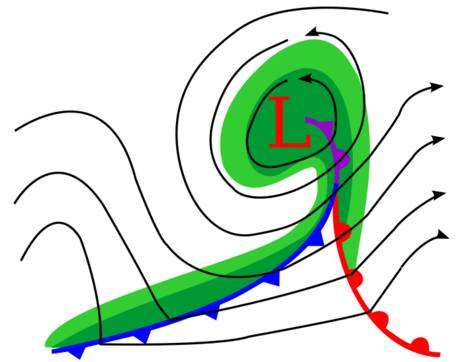
Excerpt from Joan Didion's The White Album (click to enlarge)—
"A place belongs forever to whoever claims it hardest…." —Joan Didion
"Then came From Here to Eternity ." —Art Wars
"Someday I'll wish upon a star…." —The Definitive Collection
“Next to the bookcase stands a wooden cabinet with 24 drawers that looks like something you might have seen in a library decades ago, or perhaps in an old apothecary. The drawers are marked with the names of her novels or characters in the novels and crammed with indexed notes.
She pulls open a drawer marked ‘Lozen,’ the name of a main female character in another historical western novel, ‘The Ghost Warrior,’ and reads a few of the index tabs: ‘social relationships, puberty, death, quotes….'”
— From an article on Lucia St. Clair Robson in The Baltimore Sun by Arthur Hirsch, dated 1:31 p.m. EDT April 30, 2011*
From this journal later that same day —
 |
Robson’s most recent novel is Last Train from Cuernavaca .
“A corpse will be transported by express!”
— Malcolm Lowry, Under the Volcano
* Update of 5:48 AM EDT May 3—
The same article was also published with a different dateline— April 28.
Enthusiasts of synchronicity may lament the confusion, or they may
turn to April 28 in this journal for a different 24-part invention.
See also Art Wars, April 7, 2003 and White Horse .
"Art has to reveal to us ideas, formless spiritual essences."
— A character clearly talking nonsense, from the National Library section of James Joyce's Ulysses
"Unsheathe your dagger definitions. Horseness is the whatness of allhorse."
— A thought of Stephen Dedalus in the same Ulysses section
For a representation of horseness related to Singer's dagger definitions in Saturday evening's post, see Generating the Octad Generator and Art Wars: Geometry as Conceptual Art.
More seriously, Joyce's "horseness" is related to the problem of universals. For an illuminating approach to universals from a psychological point of view, see James Hillman's Re-Visioning Psychology (Harper Collins, 1977). (See particularly pages 154-157.)
For Hanukkah (which starts this evening)—
Part I — The Stella Octangula (see also Monday's ART WARS post)—
Part II — A different view of the Stella —
Click images for some mathematical background.
For some philosophical background on illusion and reality, see Graham Priest in the Sunday, Nov. 28, New York Times column "The Stone" and in a work of fiction he published in the Notre Dame Journal of Formal Logic (Vol. 38, No. 4) in 1997.
* See Google Images for pictures that are less academically respectable.
For some related religious lore, see Merkabah at Wikipedia.
The title phrase is from Art Wars and various posts in this journal.
"Go ahead," he said; he handed her three Chinese brass coins
with holes in the center. "I generally use these."
— The Man in the High Castle , quoted here on Nov. 14, 2003
See also Tangled Tale, Yonda Lies the Castle, and a gathering in Dublin today.
Steve Martin’s new novel An Object of Beauty will be released tomorrow.
“The most charmingly rendered female schemer since Truman Capote’s Holly Golightly.”
— Elle magazine
“Martin compresses the wild and crazy end of the millennium
and finds in this piercing novel a sardonic morality tale….
Exposes the sound and fury of the rarified Manhattan art world.”
— Publishers Weekly
“Like Steve Martin’s Shopgirl , this very different novel will captivate your attention from start to finish.”
— Joyce Carol Oates
Martin on his character Ray Porter in the novella Shopgirl (published Oct. 11, 2000)—

“He said, ‘I wrote a piece of code
that they just can’t seem to do without.’
He was a symbolic logician. That was his career….”
As the above review notes, Martin’s new book is about art at the end of the millennium.
See also Art Wars: Geometry as Conceptual Art
and some of my own notes from 2000 (March 9) in “Is Nothing Sacred?”
Some related material —
A paperback with a striking cover (artist unknown)—

Note that the background may be constructed from
any of four distinct motifs. For another approach to these
motifs in a philosophical context, see June 8, 2010.
“Visual forms— lines, colors, proportions, etc.— are just as capable of articulation , i.e. of complex combination, as words. But the laws that govern this sort of articulation are altogether different from the laws of syntax that govern language. The most radical difference is that visual forms are not discursive . They do not present their constituents successively, but simultaneously, so the relations determining a visual structure are grasped in one act of vision.”
– Susanne K. Langer, Philosophy in a New Key
A new NY Times column:
Today's New York Times
re-edited for philosophers:
See also
John Baez's paper
Duality in Logic and Physics
(for a May 29 meeting at Oxford),
Lubtchansky's Key, with its links
to Duelle (French, f. adj., dual)
and Art Wars for Trotsky's Birthday.
William Lubtchansky, a cinematographer, was born on October 26, 1937, and died on May 4, 2010.
Yesterday's post included an illustration from this journal on the date of his death.
Here is a Log24 entry from last year on the date of his birth—
| Monday, October 26, 2009 The Keys Enigma Related material: |
Clicking on the Shift Lock key leads to the following page—

—The Philosopher's Gaze,
by David Michael Levin,
University of California Press, 1999
Related images—
Detail from May 4 image:

Holocaust Museum, Washington, DC:

(http://www.scrapbookpages.com/USHMM/Exterior.html)
See also Lubtchansky's Duelle and
Art Wars for Trotsky's Birthday, 2003.
|
January 06, 2007 Picture of Nothing
“Varnedoe’s lectures were ultimately about faith, about his faith in the power of abstraction, and abstraction as a kind of anti-religious faith in itself….” Related material: The more industrious scholars will derive considerable pleasure from describing how the art-history professors and journalists of the period 1945-75, along with so many students, intellectuals, and art tourists of every sort, actually struggled to see the paintings directly, in the old pre-World War II way, like Plato’s cave dwellers watching the shadows, without knowing what had projected them, which was the Word.” — Tom Wolfe, The Painted Word “Concept (scholastics’ verbum mentis)– theological analogy of Son’s procession as Verbum Patris, 111-12″ — Index to Joyce and Aquinas, by William T. Noon, S.J., Yale University Press 1957, second printing 1963, page 162
“So did God cause the big bang? Overcome by metaphysical lassitude, I finally reach over to my bookshelf for The Devil’s Bible. Turning to Genesis I read: ‘In the beginning there was nothing. And God said, ‘Let there be light!’ And there was still nothing, but now you could see it.'”
— Jim Holt, Big-Bang Theology, from Slate‘s “High Concept” department  “Bang.” “…Mondrian and Malevich are not discussing canvas or pigment or graphite or any other form of matter. They are talking about Being or Mind or Spirit. From their point of view, the grid is a staircase to the Universal….” For properties of the “nothing” represented by the 3×3 grid, see The Field of Reason. For religious material related to the above and to Epiphany, a holy day observed by some, see Plato, Pegasus, and the Evening Star and Shining Forth.
|
Some Context:
See also Nativity.
Singer 7-Cycles
Click on images for details.
The 1985 Cullinane version gives some algebraic background for the 1987 Curtis version.
The Singer referred to above is James Singer. See his "A Theorem in Finite Projective Geometry and Some Applications to Number Theory," Transactions of the American Mathematical Society 43 (1938), 377-385.For other singers, see Art Wars and today's obituaries.
Some background: the Log24 entry of this date seven years ago, and the entries preceding it on Las Vegas and painted ponies.
For John Cramer’s
daughter Kathryn
(continued from
September 24, 2002)
“Mathematical relationships were
enough to satisfy him, mere formal
relationships which existed at
all times, everywhere, at once.”
— Broken Symmetries, 1983
| X | ||
| X | ||
| X |
The Astor Place sculpture, near Cooper Union, is also known as The Borg Cube:
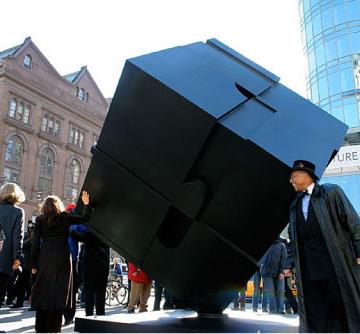
The Borg Cube, with
Cooper Union at left
Wikipedia on The Borg Queen:
Possible Borg-Queen candidates:
Helen Mirren, who appeared in this journal on the date of Rosenthal's death (see Monumental Anniversary), and Julie Taymor, who recently directed Mirren as Prospera in a feminist version of "The Tempest."
Both Mirren and Taymor would appreciate the work of Anita Borg, who pioneered the role of women in computer science. "Her colleagues mourned Borg's passing, even as they stressed how crucial she was in creating a kind of collective consciousness for women working in the heavily male-dominated field of computer technology." —Salon.com obituary

Anita Borg
Borg died on Sunday, April 6, 2003. See The New York Times Magazine for that date in Art Wars: Geometry as Conceptual Art—

I would award the Borg-Queen Tony to Taymor, who seems to have a firmer grasp of technology than Mirren.
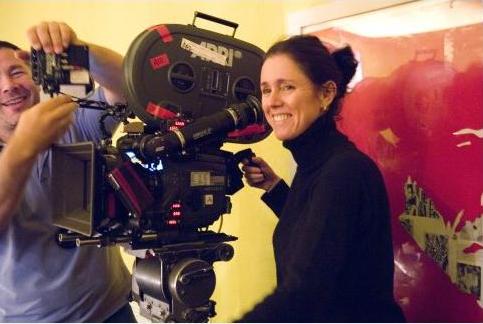
See Language Game,
Wittgenstein's birthday, 2009.
Quoted here
a year ago today:
“… she explores
the nature of identity
in a structure of
crystalline complexity.”
— Janet Burroway
(See ART WARS.)
Related material:

Amy Adams in Doubt

Amy Adams and Meryl Streep
at premiere of Doubt

Above:
Craft, 1999
“The matron had given her
leave to go out as soon as
the women’s tea was over….”
— James Joyce, “Clay”

|
Hotel Puzzle by John Tierney "Russell Crowe arrives at the Hotel Infinity looking tired and ornery. He demands a room. The clerk informs him that there are no vacancies…."
|
Footprints from California today
(all by a person or persons using Firefox browsers):
7:10 AM
http://m759.xanga.com/679142359/concepts-of-space/?
Concepts of Space: Euclid vs. Galois
8:51 AM
http://m759.xanga.com/689601851/art-wars-continued/?
Art Wars continued: Behind the Picture
1:33 PM
http://m759.xanga.com/678995132/a-riff-for-dave/?
A Riff for Dave: Me and My Shadow
2:11 PM
http://m759.xanga.com/638308002/a-death-of-kings/?
A Death of Kings: In Memory of Bobby Fischer
2:48 PM
http://m759.xanga.com/691644175/art-wars-in-review–/?
Art Wars in review– Through the Looking Glass: A Sort of Eternity
3:28 PM and
http://m759.xanga.com/684680406/annals-of-philosophy/?
Annals of Philosophy: The Dormouse of Perception
4:28 PM
http://m759.xanga.com/641536988/epiphany-for-roy-part-i/?
Epiphany for Roy, Part I
6:03 PM
http://m759.xanga.com/641949564/art-wars-continued/?
At the Still Point: All That Jazz
6:22 PM
http://m759.xanga.com/644330798/where-entertainment-is-not-god/?
Where Entertainment is Not God: The Just Word
7:14 PM
http://m759.xanga.com/643490468/happy-new-yorker-day/?
Happy New Yorker Day– Class Galore
7:16 PM
http://m759.xanga.com/643812753/the-politics-of-change/?
The Politics of Change: Jumpers
mentioned in
this afternoon's entry
"Emblematizing the Modern"
was the object of a recent
cinematic chase sequence
(successful and inspiring)
starring Mira Sorvino
at the Metropolitan
Museum of Art.
In memory of
Dr. Hunter S. Thompson,
dead by his own hand
on this date
four years ago —
There is
another sort of object
we may associate with a
different museum and with
a modern Constantine …
See "Art Wars for MoMA"
(Dec. 14, 2008).
This object, modern
rather than medieval,
is the ninefold square:
It may suit those who,
like Rosalind Krauss
(see "Emblematizing"),
admire the grids of modern art
but view any sort of Christian
cross with fear and loathing.
For some background that
Dr. Thompson might appreciate,
see notes on Geometry and Death
in this journal, June 1-15, 2007,
and the five Log24 entries
ending at 9 AM Dec. 10. 2006,
which include this astute
observation by J. G. Ballard:
Selah.
Part I: The Pagan View
From The Fire, Katherine Neville's sequel to her novel The Eight:
"'Cat…. realized that we all need some kind of a chariot driver to pull our forces together, like those horses of Socrates, one pulling toward heaven, one toward the earth….'
… I asked, 'Is that why you said my mother's and my birthdays are important? Because April 4 and October 4 are opposite in the calendar?'
Rodo beamed a smile…. He said, 'That's how the process takes place….'"
Part II: The Christian View
"The Calendar of saints is a traditional Christian method of organizing a liturgical year by associating each day with one or more saints and referring to the day as that saint's feast day. The system arose from the very early Christian custom of annual commemoration of martyrs on the dates of their deaths, or birth into heaven, and is thus referred to in Latin as dies natalis ('day of birth')." –Wikipedia
The October 4 date above, the birthday of Cat's daughter, Xie, in The Fire, is also the liturgical Feast of St. Francis of Assisi (said by some to be also the date of his death).
The April 4 date above is Neville's birthday and that of her alter ego Cat in The Eight and The Fire. Neville states that this is also the birth date of Charlemagne. It is, as well, the dies natalis (in the "birth into heaven" sense), of Dr. Martin Luther King.
For more about April 4, see Art Wars and 4/4/07.
For more about October 4, see "Revelation Game Continued: Short Story."
"et lux in tenebris lucet
et tenebrae eam
non comprehenderunt"
Something Traditional —
“German Chancellor Dr. Angela Merkel is the Charlemagne Prize laureate of 2008…. The prize will be awarded on 1 May, Ascension Day.”
Something Modern —
Previously undescribed in this journal:

| A NOTE BY THE DESIGNER
“The traditional chess set, with its naturalistic images of medieval armies, suggests a game between combatants who enjoy the winning of battles. This chess set, with its articulated images of abstract force, suggests a game between contestants who enjoy the process of thinking.
The primary principle of this design… is that the operating reality or function of each piece– both its value and how it moves– is embodied in a simple self-expressive form….  Design Copyright F. Lanier Graham 1967
— F. Lanier Graham, 1967 |
Related material: this journal on the First of May, 2008, the date of last year’s Charlemagne award.
A figure from
Nobel Prize day, December 10,
and from Eugene Wigner‘s
birthday, November 17:
Also on December 10:
the death of Constantine–
(Click for details.)
Related material:
Tina Modotti: A Fragile Life,
Photos by Tina Modotti,
Art Wars for Trotsky’s Birthday,
as well as
Art Wars, June 1-15, 2007:
“Ay que bonito es volar
A las dos de la mañana….”
— “La Bruja“
From Koestler’s Darkness at Noon, a fictional Communist on propaganda:
“It is necessary to hammer every sentence into the masses by repetition and simplification. What is presented as right must shine like gold; what is presented as wrong must be black as pitch.”
Thanks for this quotation to Kati Marton, author of The Great Escape: Nine Jews Who Fled Hitler and Changed the World (Simon & Schuster, paperback edition Nov. 6, 2007). One of Marton’s nine was Koestler.

From another book related to this exodus:
“Riesz was one of the most elegant mathematical writers in the world, known for his precise, concise, and clear expositions. He was one of the originators of the theory of function spaces– an analysis which is geometrical in nature.”
— Stanislaw Ulam, Adventures of a Mathematician
And from Gian-Carlo Rota, a friend of Ulam:
“Riesz’s example is well worth following today.”
Related material: Misunderstanding in the Theory of Design and Geometry for Jews.
For a different approach to ethnicity and the number nine that is also “geometrical in nature,” see The Pope in Plato’s Cave and the four entries preceding it, as well as A Study in Art Education.
Stevie Nicks
is 60 today.
On the author discussed
here yesterday,
Siri Hustvedt:
“… she explores
the nature of identity
in a structure* of
crystalline complexity.”
— Janet Burroway,
quoted in
ART WARS


“Is it safe?”
— Annals of Art Education:
Geometry and Death
* Related material:
the life and work of
Felix Christian Klein
and
Report to the Joint
Mathematics Meetings
Lucy in the Sky
with Diamonds
and Sacred Heart
PARIS — Albert Hofmann, the mystical Swiss chemist who gave the world LSD, the most powerful psychotropic substance known, died Tuesday at his hilltop home near Basel, Switzerland. He was 102.
Related material:
and
a film by Julie Taymor,
Across the Universe:
Detail of the
Strawberry Fields Forever
Sacred Heart:
A song:Julie Taymor
“Shinin’ like a diamond,
she had tombstones
in her eyes.”— Album “The Dark,”
by Guy ClarkFor related tombstones,
see May 16-19, 2006,
and April 19, 2008.Further background:
Art Wars for
Red October.
From Log24 on
this date four years ago:

— Motto of
Plato’s Academy
Related material:
The “greatest generation” theme from Art Wars– April 7, 2003 continues in two obituaries from this morning’s New York Times:

The first obituary says that Goldberg
“saw abstract painting… as ‘still the primary visual challenge of our time. It might get harder and harder to make an abstract image that’s believable, but I think that just makes the challenge greater.'” The Times says that Goldberg was a veteran of Merrill’s Marauders in World War II (as well as of the last century’s art wars).
The second obituary notes that Astor’s books include A Blood-Dimmed Tide (a phrase from Yeats)– an account of the Battle of the Bulge– and a biography of Dr. Josef Mengele.
Both men died on Sunday, December 30, 2007. From Log24 on that date, an abstract image and a cinematic portrait of Dr. Mengele:
Yesterday’s entry
The Revelation Game
and an entry of April 7, 2003:
April is Math Awareness Month.
This year’s theme is “mathematics and art.”

(The art, by Ingmar Bergman, was
in honor of the April 7 birthday of
Francis Ford Coppola, director of
“Apocalypse Now.”)
— The missing last words
of Inman in Cold Mountain,
added here on the
Feast of St. Luke, 2004
7: In that night did God appear unto Solomon, and said unto him, Ask what I shall give thee.
8: And Solomon said unto God, Thou hast shewed great mercy unto David my father, and hast made me to reign in his stead.
9: Now, O LORD God, let thy promise unto David my father be established: for thou hast made me king over a people like the dust of the earth in multitude.
10: Give me now wisdom and knowledge, that I may go out and come in before this people: for who can judge this thy people, that is so great?
"At 42– a professor with no museum experience– he was named curator of painting and sculpture at the Museum of Modern Art. It was, and is, the most influential job in the fluid, insular, fiercely contentious world of modern art. Just two decades past his last Amherst game, the lineman from Savannah was sitting in the chair where the most critical decisions in his profession are made– 'the conscientious, continuous, resolute distinction of quality from mediocrity,' according to his Olympian predecessor Alfred Barr. The Modern and its chief curator serve the American art establishment as a kind of aesthetic Supreme Court, and most of their rulings are beyond appeal."
On Quality
Varnedoe, in his final
Mellon lecture at
the National Gallery,
quoted "Blade Runner"–
"I've seen things
you people wouldn't believe….
"Frank Rich of The New York Times
on the United States of America:
"A country where
entertainment is god."
Rich's description may or may not
be true of the United States, but
it certainly seems true of
The New York Times:
Click on image to enlarge.
Related material:

“Thomas P. Whitney, a former diplomat and writer on Russian affairs who was best known for translating the work of the dissident writer Aleksandr Solzhenitsyn into English, died on [Sunday] Dec. 2 in Manhattan. He was 90….
During World War II, he was an analyst in Washington with the Office of Strategic Services, a forerunner of the Central Intelligence Agency….
In the late 1960s and afterward, he bred thoroughbred horses….
On one occasion, Mr. Whitney took Mr. Solzhenitsyn to Saratoga Racetrack….”
Related material:
“The best of the books are the ones…
where the allegory is at a minimum
and the images just flow.”
“‘Everything began with images,’
Lewis wrote….”
Yesterday’s entry on
Solzhenitsyn and The Golden Compass
and the following illustrations…
from Sunday in the Park with Death,
a Log24 entry commemorating
Trotsky’s birthday–
–and from Log24 on the date
of Whitney’s death,
Sunday, Dec. 2, 2007—

Personal Emblem
of psychiatrist
Harry Stack Sullivan
The horses may refer to
the Phaedrus of Plato.
See also Art Wars.

Will Hunting may be
interested in the following
vacant editorships at
The Open Directory:
Graph Theory
and
Combinatorics.
Related material:
The Long Hello and
On the Holy Trinity —
"Hey, Carrie-Anne, what's
your game now….?"
Picture sources:
azstarnet.com,
vibrationdata.com.
Personally, I prefer
Carol Ann:
From Criticism, Fall, 2001,
by Carol Ann Johnston—
|
"Drawing upon Platonic thought, Augustine argues that ideas are actually God's objective pattern and as such exist in God's mind. These ideas appear in the mirror of the soul. (35)." (35.) In Augustine, De Trinitate, trans., Stephen McKenna (Washington, D.C.: Catholic University Press, 1970). See A. B. Acton, "Idealism," in The Encyclopedia of Philosophy, ed., Paul Edwards. Vol. 4 (New York: Macmillan, 1967): 110-118; Robert McRae, "`Idea' as a Philosophical Term in the Seventeenth Century," JHI 26 (1965): 175-190, and Erwin Panofsky, Idea: A Concept in Art History, trans., Joseph J. S. Peake (Columbia, S.C.: University of South Carolina Press, 1968) for explications of this term. |
For more on Augustine and geometry,
see Today's Sinner (Aug. 28, 2006).

Scarlett Johansson and friend
in “The Horse Whisperer” (1998)
“‘The University of Sydney has ordered an independent review into allegations that the dean of the Conservatorium of Music hired a horse whisperer to conduct management workshops.’ [Are you, like UD, a bit vague on exactly what a horse whisperer is? And are you having trouble figuring out what a horse whisperer would have to offer a management workshop? But then, what exactly is a management workshop? Read on.]”
For some background on horse whispering and management workshops, see IABC Steal Sheet, March 2004.
Related material:
The recent Log24 entries
|
“Descartes déclare que For further details, |

The above scene from
The Best of Riverdance
furnishes an exercise in
what Victor Turner has called
“comparative symbology.”
The circular symbol at top
may be seen as representing
the solar deity Apollo,
Leader of the Muses.
The nine female dancers
may be seen as
the nine muses,
with Jean Butler
at the center
as Terpsichore,
Muse of Dance.
Related Material —

“This is the garden of Apollo,
the field of Reason….”
John Outram, architect
For another look at
Terpsichore in action,
see Jean Butler at
CRC Irish Dance Camp.
For those who prefer
a different sort of camp
there is of course
Xanadu.
I prefer Butler.
ART WARS

Related Log24
entry from
this April
Gift of the Third Kind
Background:
Art Wars and
Russell Crowe as
Santa's Helper.
From Christmas 2005:
Related material from
Pittsburgh:
… and from Grand Rapids:
Related material
for Holy Saturday:

Related material:
“But what is it?”
Calvin demanded.
“We know that it’s evil,
but what is it?”
“Yyouu hhave ssaidd itt!”
Mrs. Which’s voice rang out.
“Itt iss Eevill. Itt iss thee
Ppowers of Ddarrkknesss!”
“After A Wrinkle in Time was finally published, it was pointed out to me that the villain, a naked disembodied brain, was called ‘It’ because It stands for Intellectual truth as opposed to a truth which involves the whole of us, heart as well as mind. That acronym had never occurred to me. I chose the name It intuitively, because an IT does not have a heart or soul. And I did not understand consciously at the time of writing that the intellect, when it is not informed by the heart, is evil.”
— Freeman Dyson,
New York Review of Books,
issue dated May 28, 1998
Excerpt:
"We are left to conclude that there was something significant in Hobbes's philosophy that motivated Wallis to engage in the lengthy and vitriolic denunciation of all things Hobbesian.
In point of fact, Wallis made no great secret of his motivations for attacking Hobbes's geometry, and the presence of theological and political motives is well attested in a 1659 letter to Huygens. He wrote:
But regarding the very harsh diatribe against Hobbes, the necessity of the case, and not my manners, led to it. For you see, as I believe, from other of my writings how peacefully I can differ with others and bear those with whom I differ. But this was provoked by our Leviathan (as can be easily gathered fro his other writings, principally those in English), when he attacks with all his might and destroys our universities (and not only ours, but all, both old and new), and especially the clergy and all institutions and all religion. As if the Christian world knew nothing sound or nothing that was not ridiculous in philosophy or religion; and as if it has not understood religion because it does not understand philosophy, nor philosophy because it does not understand mathematics. And so it seemed necessary that now some mathematician, proceeding in the opposite direction, should show how little he understand this mathematics (from which he takes his courage). Nor should we be deterred from this by his arrogance, which we know will vomit poison and filth against us. (Wallis to Huygens, 11 January, 1659; Huygens 1888-1950,* 2: 296-7)
The threats that Hobbes supposedly posed to the universities, the clergy, and all religion are a consequence of his political and theological doctrines. Hobbes's political theory requires that the power of the civil sovereign be absolute and undivided. As a consequence, such institutions as universities and the clergy must submit to the dictates of the sovereign in all matters. This extends, ironically enough, to geometry, since Hobbes notoriously claimed that the sovereign could ban the teaching of the subject and order 'the burning of all books of Geometry' if he should judge geometric principles 'a thing contrary to [his] right of dominion, or to the interest of men that have dominion' (Leviathan (1651) 1.11, 50; English Works** 3: 91). In the area of church government, Hobbes's doctrines are a decisive rejection of the claims of Presbyterianism, which holds that questions of theological doctrine is [sic] to be decided by the elders of the church– the presbytery– without reference to the claims of the sovereign. As a Presbyterian minister, a doctor of divinity, and professor of geometry at Oxford, Wallis found abundant reason to reject this political theory."
* Huygens, Christiaan. 1888-1950. Les oeuvres complètes de Chrisiaan Huygens. Ed. La Société Hollandaise des Sciences. 22 vols. The Hague: Martinus Nijhoff.
** Hobbes, Thomas. [1839-45] 1966. The English Works of Thomas Hobbes of Malmesbury, now First Collected and Edited by Sir William Molesworth. Edited by William Molesworth. 11 vols. Reprint. Aalen, Germany: Scientia Verlag.
"But what is it?"
Calvin demanded.
"We know that it's evil,
but what is it?"
"Yyouu hhave ssaidd itt!"
Mrs. Which's voice rang out.
"Itt iss Eevill. Itt iss thee
Ppowers of Ddarrkknesss!"
"After A Wrinkle in Time was finally published, it was pointed out to me that the villain, a naked disembodied brain, was called 'It' because It stands for Intellectual truth as opposed to a truth which involves the whole of us, heart as well as mind. That acronym had never occurred to me. I chose the name It intuitively, because an IT does not have a heart or soul. And I did not understand consciously at the time of writing that the intellect, when it is not informed by the heart, is evil."

and
“The False Artaxerxes:
Borges and the
Dream of Chess“
This entry was inspired by
Xanga footprints yesterday
from Virginia:
| 1. Virginia Weblog ART WARS: Time and the Grid |
3/6/2007 9:48 AM |
| 2. Virginia Weblog Sequel |
3/6/2007 11:38 AM |
| 3. Virginia Weblog Games and Truth |
3/6/2007 1:25 PM |
| 4. Virginia /item.aspx?user=m759&ta… The Transcendent Signified |
3/6/2007 5:15 PM |
| 5. Virginia /item.aspx?user=m759&ta… Zen and Language Games |
3/6/2007 5:16 PM |
| 6. Virginia /item.aspx?user=m759&ta… Balanchine’s Birthday |
3/6/2007 6:12 PM |
| 7. Virginia /item.aspx?user=m759&ta… The Agony and the Ya-Ya |
3/6/2007 6:12 PM |
| 8. Virginia /item.aspx?user=m759&ta… Directions Out |
3/6/2007 6:13 PM |
| 9. Virginia /item.aspx?user=m759&ta… The Four Last Things |
3/6/2007 6:13 PM |
Best Wishes for a
C. S. Lewis
Christmas

Image of Lewis from |
“What on earth is a concrete universal?” — Robert M. Pirsig, author of Zen and the Art of Motorcyle Maintenance For one approach to an answer, click on the picture at left. |
Update of 4:23 PM:
The Lewis link above deals with the separation of Heaven from Hell. The emphasis is on Heaven. A mysterious visitor to this website, “United States,” seems to be seeking equal time for Hell. And so…
TIME OF DATE OF PAGE VISITED
VISIT PAGE VISITED
1217 040520 Parable
1218 060606 The Omen
1220 051205 Don’t Know Much About History
1225 030822 Mr. Holland’s Week (And in Three Days…)
1233 030114 Remarks on Day 14 (What is Truth?)
1238 040818 Train of Thought (Oh, My Lolita)
1244 020929 Angel Night (Ellis Larkins)
1249 040715 Identity Crisis (Bourne and Treadstone)
1252 050322 Make a Differance (Lacan, Derrida, Reba)
1255 050221 Quarter to Three on Night of HST’s death
1256 040408 Triple Crown on Holy Thursday
1258 040714 Welcome to Mr. Motley’s Neighborhood
1258 030221 All About Lilith
0103 040808 Quartet (for Alexander Hammid)
0104 030106 Dead Poet in the City of Angels
0109 030914 Skewed Mirrors (Readings on Aesthetics)
0110 050126 A Theorem in Musical Form
0125 021007 Music for R. D. Laing
0138 020806 Butterflies & Popes (Transfiguration)
0140 060606 The Omen (again)
0156 030313 ART WARS: Perennial Tutti-Frutti
0202 030112 Ask Not (A Bee Gees Requiem)
0202 050527 Drama of the Diagonal, Part Deux
0202 060514 STAR WARS continued (Eclipse and Venus)
0207 030112 Ask Not (again… Victory of the Goddess)
0207 030221 All About Lilith (again… Roll credits.)
From the Online Etymology Dictionary:
crucial – 1706, from Fr. crucial… from L. crux (gen. crucis) “cross.” The meaning “decisive, critical” is extended from a logical term, Instantias Crucis, adopted by Francis Bacon (1620); the notion is of cross fingerboard signposts* at forking roads, thus a requirement to choose.
“… given the nature of our intellectual commerce with works of art, to lack a persuasive theory is to lack something crucial— the means by which our experience of individual works is joined to our understanding of the values they signify.”
— Hilton Kramer in The New York Times, April 28, 1974
“I realized that without making the slightest effort I had come upon one of those utterances in search of which psychoanalysts and State Department monitors of the Moscow or Belgrade press are willing to endure a lifetime of tedium: namely, the seemingly innocuous obiter dicta, the words in passing, that give the game away.
What I saw before me was the critic-in-chief of The New York Times saying: In looking at a painting today, ‘to lack a persuasive theory is to lack something crucial.’ I read it again. It didn’t say ‘something helpful’ or ‘enriching’ or even ‘extremely valuable.’ No, the word was crucial….
The more industrious scholars will derive considerable pleasure from describing how the art-history professors and journalists of the period 1945-75, along with so many students, intellectuals, and art tourists of every sort, actually struggled to see the paintings directly, in the old pre-World War II way, like Plato’s cave dwellers watching the shadows, without knowing what had projected them, which was the Word.”
— Tom Wolfe, The Painted Word
For some related material from the next 30 years, 1976-2006, see Art Wars.
* “Note that in the original Latin, the term is not by any means ‘fingerpost’ but simply ‘cross’ (Latin Crux, crucis) – a root term giving deeper meaning to the ‘crucial’ decision as to which if any of the narratives are ‘true,’ and echoing the decisive ‘crucifixion’ revealed in the story.”

“This is the garden of Apollo,
the field of Reason….”
John Outram, architect
To Apollo (10/09/02)
Art Wars: Apollo and Dionysus (10/09/02)
Balanchine’s Birthday (01/09/03)
Art Theory for Yom Kippur (10/05/03)
A Form (05/22/04)
Ineluctable (05/27/04)
A Form, continued (06/05/04)
Parallelisms (06/06/04)
Ado (06/25/04)
Deep Game (06/26/04)
Gameplayers of Zen (06/27/04)
And So To Bed (06/29/04)
Translation Plane for Rosh Hashanah (09/15/04)
Derrida Dead (10/09/04)
The Nine (11/09/04)
From Tate to Plato (11/19/04)
Art History (05/11/05)
A Miniature Rosetta Stone (08/06/05)
High Concept (8/23/05)
High Concept, Continued (8/24/05)
Analogical Train of Thought (8/25/05)
Today’s Sermon: Magical Thinking (10/09/05)
Balance (10/31/05)
Matrix (11/01/05)
Seven is Heaven, Eight is a Gate (11/12/05)
Nine is a Vine (11/12/05)
Apollo and Christ (12/02/05)
Hamilton’s Whirligig (01/05/06)
Cross (01/06/06)
On Beauty (01/26/06)
Sunday Morning (01/29/06)
Centre (01/29/06)
New Haven (01/29/06)
Washington Ballet (02/05/06)
Catholic Schools Sermon (02/05/06)
The Logic of Apollo (02/05/06)
Game Boy (08/06/06)
Art Wars Continued: The Krauss Cross (09/13/06)
Art Wars Continued: Pandora’s Box (09/16/06)
The Pope in Plato’s Cave (09/16/06)
Today’s Birthdays (09/26/06)
Symbology 101 (09/26/06)
Pandora's Box
Part I:
The Pandora Cross
— Rosalind Krauss in "Grids"

Part II:
The Opening
Remarks by the Pope on Sept. 12,
as reported by the Vatican:
Faith, Reason, and the University:
Memories and Reflections
For the result of
the Pope's remarks, see
a transcript of
yesterday's Google News
and the following
from BBC today:

Click to enlarge the screenshot.
Part III:
Hope
"In September [2005], she had a private audience with Pope Benedict XVI at Castel Gandolfo, his summer residence outside Rome. She had criticized John Paul II for making overtures to Muslims, and for not condemning terrorism heartily enough, but she has hopes for Joseph Ratzinger."
For further details, see yesterday's Log24.
Part IV:
The Sibyl's Song
— From The Magic Circle,
a spiritual narrative
by Katherine Neville
For more on "the long-mute voice
of the past," on "darkness beneath
the volcano," and on uncorking,
see Glory Season and Harrowing.
Related material from
Log24 on Dec. 2, 2005:
Benedict XVI, before he became Pope:

and a related
Christian symbol,

the Greek Cross
(adapted from
Ad Reinhardt).
Moral of the Pandora Cross:
"Nine is a very powerful Nordic number."
— Katherine Neville in The Magic Circle…
quoted in The Nine, a Log24 entry
for Hermann Weyl's birthday,
November 9, 2004.
The Krauss Cross
"If we open any tract– Plastic Art and Pure Plastic Art or The Non-Objective World, for instance– we will find that Mondrian and Malevich are not discussing canvas or pigment or graphite or any other form of matter. They are talking about Being or Mind or Spirit. From their point of view, the grid is a staircase to the Universal, and they are not interested in what happens below in the Concrete.
Or, to take a more up-to-date example, we could think about Ad Reinhardt who, despite his repeated insistence that 'Art is art,' ended up by painting a series of black nine-square grids in which the motif that inescapably emerges is a Greek cross. There is no painter in the West who can be unaware of the symbolic power of the cruciform shape and the Pandora's box of spiritual reference that is opened once one uses it."
Rebecca Goldstein on
Mathematics and Narrative:
"I don't write exclusively on Jewish themes or about Jewish characters. My collection of short stories, Strange Attractors, contained nine pieces, five of which were, to some degree, Jewish, and this ratio has provided me with a precise mathematical answer (for me, still the best kind of answer) to the question of whether I am a Jewish writer. I am five-ninths a Jewish writer."
Jacques Maritain,
October 1941:
"The passion of Israel
today is taking on
more and more distinctly
the form of the Cross."
E. L. Doctorow,
City of God:
"In the garden of Adding,
Live Even and Odd."
ART WARS
continued:
Sources:
This morning’s Log24 entry,
today’s New York Times Magazine,
and today’s Doonesbury.
Related material:
My Life among the Deathworks:
Illustrations of the
Aesthetics of Authority,
by Philip Rieff,
Sontag’s ex-husband.
See also Nicole Kidman in
the 2004 remake of
The Stepford Wives.
ART WARS continued
Adapted from Rick McKee,
Augusta Chronicle, Aug. 2, 2006
Click on picture for details.
Script:
“David Stuart, a University of Texas master of Maya writing, stopped by and tried to be helpful….
‘There’s a playfulness to the script,’ Dr. Stuart said. ‘It was not a writing system that was necessarily there to be as clear as it could be. It was communicating language, but it was doing it as art.'”
— My Maya Crash Course
in The New York Times
of May 16, 2006
“… apocalypto means to open up
and to show the truth….”
“Examples are the
stained-glass windows
of knowledge.”
— Vladimir Nabokov
Today’s New York Times:
Jason Rhoades, 41, Maker of
Transgressive Installations,
Is Dead
For some background
on Rhoades’s Manhattan
ART WARS
continued from
previous entry
In memory of
Elisabeth Schwarzkopf:
This question might
well be posed by…

Rosalind Krauss,
Meyer Schapiro Professor
of Modern Art and Theory
at Columbia University
(Ph.D., Harvard U., 1969).
"The grid is a staircase to the Universal….
We could think about Ad Reinhardt, who,
despite his repeated insistence that
'Art is art,'
ended up by painting a series of…
nine-square grids in which the motif
that inescapably emerges is
a Greek cross.

Adapted from
Ad Reinhardt
There is no painter in the West
who can be unaware of
the symbolic power
of the cruciform shape and the
Pandora's box of spiritual reference
that is opened once one uses it."
— Rosalind Krauss in "Grids"
"Nine is a very powerful Nordic number."
— Katherine Neville, author of The Eight
Related material:
Powered by WordPress